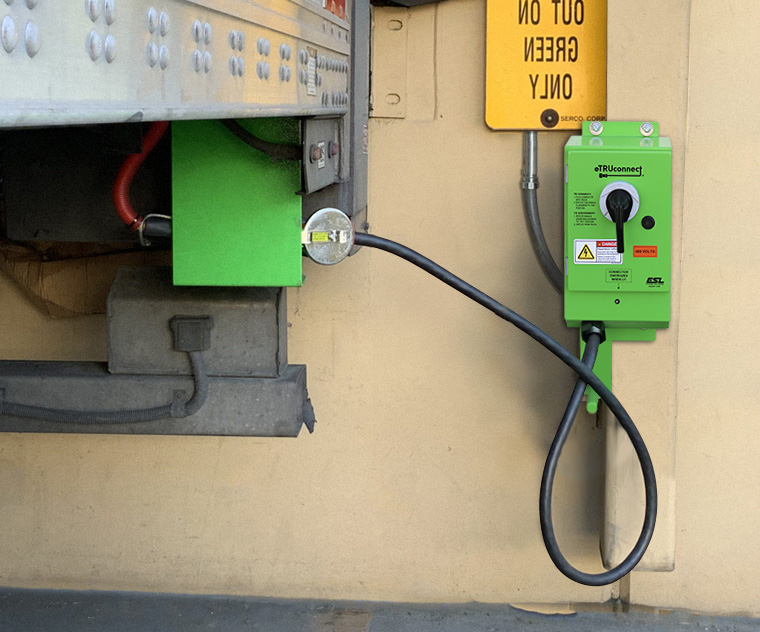
California’s CARB regulations have long shaped air quality standards in the U.S., and their influence is growing. As other states adopt similar rules and major retailers prioritize low-emission supply chains, commercial fleets and facilities across the country are under increasing pressure to align. For operations that rely on diesel-powered TRUs or manage temperature-controlled logistics, CARB compliance is now a strategic consideration, not just a regulatory requirement.
What Is CARB Compliance?
CARB, the California Air Resources Board, enforces some of the most aggressive air quality standards in the U.S., including regulations aimed at reducing emissions from diesel engines used in TRUs.
CARB compliance typically refers to:
- Meeting emission standards for diesel-powered equipment
- Reducing idling and reliance on diesel generators
- Implementing zero-emission solutions such as electric standby systems or battery-electric TRUs
For fleets using refrigerated trailers, compliance means transitioning to clean alternatives such as plug-in shore power for temperature-controlled loads at distribution centers, truck yards, and cold storage facilities.
Why CARB Compliance Matters Beyond California
California may be first, but it won’t be last.
States like New York, Oregon, and Washington have already adopted similar emission goals, and major retailers are demanding cleaner supply chains. If you operate across state lines, your non-compliant equipment could soon be sidelined.
Key reasons this matters:
- Regulatory momentum is spreading nationwide
- Major logistics partners are prioritizing sustainable fleets
- Non-compliance can limit bidding opportunities and facility access
Future-proofing isn’t optional—it’s essential.
Common Misconceptions About CARB Compliance
“This only affects California.”
False. Other states are aligning with CARB. Operating nationally means preparing now.
“We have to replace our entire fleet.”
Not necessarily. Many facilities can meet requirements with retrofits, shore power access, or dual-voltage capabilities.
“Compliance will cripple our operations.”
In truth, the right infrastructure can increase operational efficiency, reduce fuel costs, and even improve safety at the dock.
Think Compliance Is Too Costly? See the Real Numbers
Use our calculator to uncover how shore power can reduce diesel use, maintenance, and emissions—while keeping your fleet CARB compliant.
How to Stay Compliant Without Overbuilding

Too many fleets overspend chasing compliance. But smart planning and flexible infrastructure can reduce costs while still meeting requirements.
Here’s how:
- Shore power systems like ESL’s eTRUconnect® allow electric TRUs to plug in when parked, reducing emissions, fuel use, and idling.
- Dual-voltage systems support both 480V and 240V, accommodating mixed fleets without complex rewiring.
- Modular, daisy-chain capable setups can power multiple units from one input, simplifying deployment and scaling with demand.
- Break-away safety features and integrated compliance markings streamline inspection-readiness.
How ESL Helps Clients Align With CARB Requirements
At ESL, we help fleet operators and facility managers design smarter infrastructure that meets CARB requirements—without blowing the budget.
With over 30 years of experience, our solutions are:
- Purpose-built for electric and hybrid TRU power
- UL/cUL Listed with safety interlocks and rugged enclosures
- Tested and proven in high-volume logistics environments
- Custom-configured to your exact dock layout, voltage, and usage needs
Whether you’re just starting your compliance journey or looking to retrofit existing infrastructure, we provide the guidance, hardware, and ongoing support to move forward with confidence.
The Bottom Line
CARB compliance isn’t going away. But it doesn’t have to derail your operations.
With the right partners and technology in place, fleets and facilities can reduce emissions, lower costs, and stay ahead of evolving regulations.
Let’s Build the Right Compliance Solution for Your Fleet
Request a custom quote today and get the specs, pricing, and insight to move forward strategically.